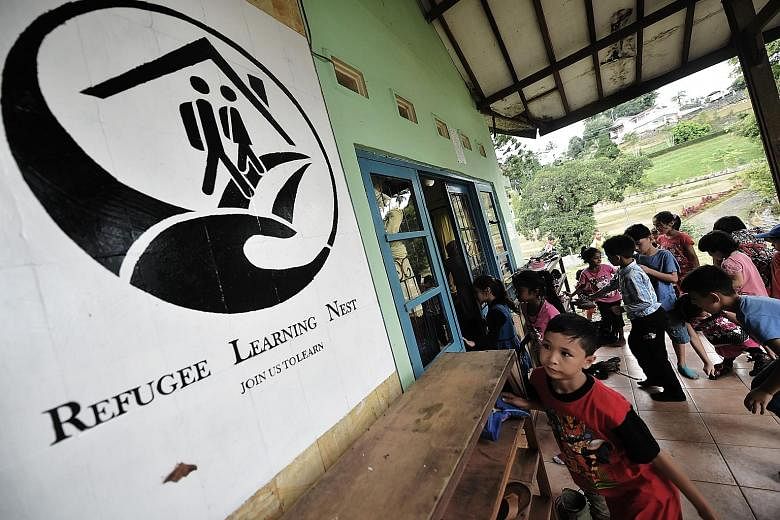CISARUA (Indonesia) • Mr Mahboob Jafari had barely seen the inside of a classroom, let alone taught in one, before he arrived in Indonesia as a refugee fleeing persecution in Afghanistan.
The 19-year-old now teaches English at a pioneering school in the mountains south of Jakarta, where refugees from war-torn corners of the globe are banding together to educate their children.
Founded by refugees, for refugees, this unique initiative is giving these children a chance to go to school while they wait years for resettlement to a new country.
The school, which marked its one-year anniversary in March, has become a source of immense pride among the migrant community in hilly Cisarua, once a key transit point on the largely closed people-smuggling route to Australia.
Its 58 students study in four brightly painted classrooms, borrow books from a small library and play football at lunchtime at a basic pitch constructed by the parents.
Nearly two dozen volunteers, all refugees themselves, teach mathematics, English, computer studies and art to students age six to 18.
As the children depart in the afternoon, their parents arrive for English classes - a top priority for families awaiting resettlement to new homes in countries like Canada, New Zealand, and the United States.
There are 13,745 refugees and asylum seekers registered with the Office of the United Nations High Commissioner (UNHCR) for Refugees in Indonesia, including nearly 2,700 children of school age.
Although refugee children can technically attend Indonesian schools, very few do, UNHCR senior protection officer Jeffrey Savage said. Language barriers, a lack of available spaces, registration problems and transport costs hinder enrolment.
The vast majority of refugee children in Indonesia go without school for years. Some are already far behind for their age, having spent a lifetime on the move.
The pupils at Learning Nest are from Afghanistan, Iran, Pakistan, Iraq and Sri Lanka.
For the teachers, volunteering helps alleviate the anxiety and boredom rife in refugee transit towns like Cisarua. Once registered with the UN refugee agency, there's little for asylum-seekers to do but wait, unable to work or study.
Other refugee communities around Cisarua are independently setting up their own education programmes, with four schools now operating in the area.
But there are still far more refugee children at home than in schools. The International Organisation for Migration (IOM), which assists refugees with housing and other essential needs, applauded community-run initiatives but stressed they only reached a handful of children in need. "The bigger picture is that there are thousands," IOM project manager Paul Dillon said.
AGENCE FRANCE-PRESSE

